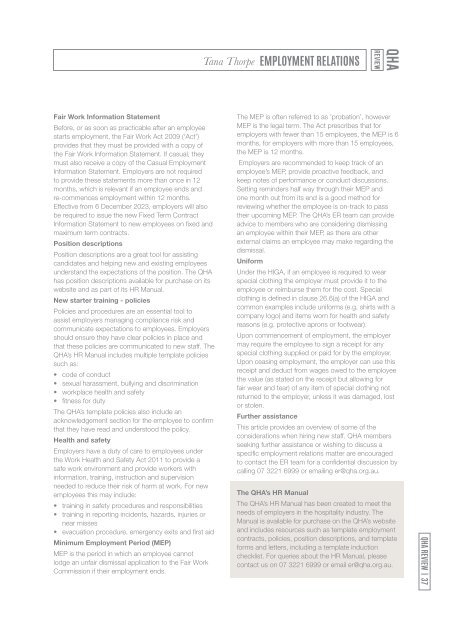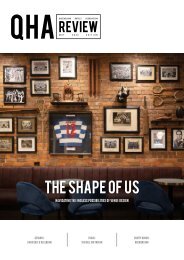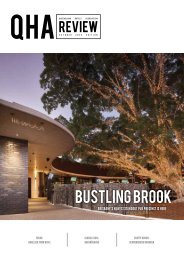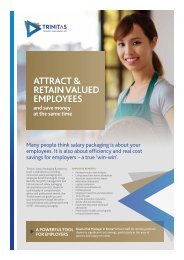QHA-Review_July_digital
You also want an ePaper? Increase the reach of your titles
YUMPU automatically turns print PDFs into web optimized ePapers that Google loves.
Tana Thorpe EMPLOYMENT RELATIONS<br />
Fair Work Information Statement<br />
Before, or as soon as practicable after an employee<br />
starts employment, the Fair Work Act 2009 (‘Act’)<br />
provides that they must be provided with a copy of<br />
the Fair Work Information Statement. If casual, they<br />
must also receive a copy of the Casual Employment<br />
Information Statement. Employers are not required<br />
to provide these statements more than once in 12<br />
months, which is relevant if an employee ends and<br />
re-commences employment within 12 months.<br />
Effective from 6 December 2023, employers will also<br />
be required to issue the new Fixed Term Contract<br />
Information Statement to new employees on fixed and<br />
maximum term contracts.<br />
Position descriptions<br />
Position descriptions are a great tool for assisting<br />
candidates and helping new and existing employees<br />
understand the expectations of the position. The <strong>QHA</strong><br />
has position descriptions available for purchase on its<br />
website and as part of its HR Manual.<br />
New starter training - policies<br />
Policies and procedures are an essential tool to<br />
assist employers managing compliance risk and<br />
communicate expectations to employees. Employers<br />
should ensure they have clear policies in place and<br />
that these policies are communicated to new staff. The<br />
<strong>QHA</strong>’s HR Manual includes multiple template policies<br />
such as:<br />
• code of conduct<br />
• sexual harassment, bullying and discrimination<br />
• workplace health and safety<br />
• fitness for duty<br />
The <strong>QHA</strong>’s template policies also include an<br />
acknowledgement section for the employee to confirm<br />
that they have read and understood the policy.<br />
Health and safety<br />
Employers have a duty of care to employees under<br />
the Work Health and Safety Act 2011 to provide a<br />
safe work environment and provide workers with<br />
information, training, instruction and supervision<br />
needed to reduce their risk of harm at work. For new<br />
employees this may include:<br />
• training in safety procedures and responsibilities<br />
• training in reporting incidents, hazards, injuries or<br />
near misses<br />
• evacuation procedure, emergency exits and first aid<br />
Minimum Employment Period (MEP)<br />
MEP is the period in which an employee cannot<br />
lodge an unfair dismissal application to the Fair Work<br />
Commission if their employment ends.<br />
The MEP is often referred to as ‘probation’, however<br />
MEP is the legal term. The Act prescribes that for<br />
employers with fewer than 15 employees, the MEP is 6<br />
months, for employers with more than 15 employees,<br />
the MEP is 12 months.<br />
Employers are recommended to keep track of an<br />
employee’s MEP, provide proactive feedback, and<br />
keep notes of performance or conduct discussions.<br />
Setting reminders half way through their MEP and<br />
one month out from its end is a good method for<br />
reviewing whether the employee is on-track to pass<br />
their upcoming MEP. The <strong>QHA</strong>’s ER team can provide<br />
advice to members who are considering dismissing<br />
an employee within their MEP, as there are other<br />
external claims an employee may make regarding the<br />
dismissal.<br />
Uniform<br />
Under the HIGA, if an employee is required to wear<br />
special clothing the employer must provide it to the<br />
employee or reimburse them for the cost. Special<br />
clothing is defined in clause 26.6(a) of the HIGA and<br />
common examples include uniforms (e.g. shirts with a<br />
company logo) and items worn for health and safety<br />
reasons (e.g. protective aprons or footwear).<br />
Upon commencement of employment, the employer<br />
may require the employee to sign a receipt for any<br />
special clothing supplied or paid for by the employer.<br />
Upon ceasing employment, the employer can use this<br />
receipt and deduct from wages owed to the employee<br />
the value (as stated on the receipt but allowing for<br />
fair wear and tear) of any item of special clothing not<br />
returned to the employer, unless it was damaged, lost<br />
or stolen.<br />
Further assistance<br />
This article provides an overview of some of the<br />
considerations when hiring new staff. <strong>QHA</strong> members<br />
seeking further assistance or wishing to discuss a<br />
specific employment relations matter are encouraged<br />
to contact the ER team for a confidential discussion by<br />
calling 07 3221 6999 or emailing er@qha.org.au.<br />
The <strong>QHA</strong>’s HR Manual<br />
The <strong>QHA</strong>’s HR Manual has been created to meet the<br />
needs of employers in the hospitality industry. The<br />
Manual is available for purchase on the <strong>QHA</strong>’s website<br />
and includes resources such as template employment<br />
contracts, policies, position descriptions, and template<br />
forms and letters, including a template induction<br />
checklist. For queries about the HR Manual, please<br />
contact us on 07 3221 6999 or email er@qha.org.au.<br />
<strong>QHA</strong> REVIEW | 37
















